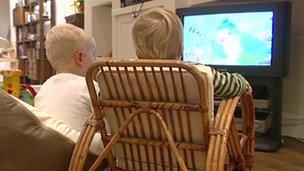Call for ban on under-11s advertising
- Published

The campaigners say advertisers pressure children and parents
Advertising aimed at children of primary school age and younger should be banned, a group of authors, journalists and academics has said.
The group supports a new campaign called Leave our kids alone, external which says techniques aimed at manipulating adult emotions and desires are being used on children as young as two in the UK.
Campaign co-founder Jonathan Kent says the adverts are like "kiddie crack".
But the advertising watchdog says rules on advertising to children are strict.
Mr Kent, a journalist and broadcaster, told the BBC he had seen the effect of advertising on his six-year-old son.
"He's like most children - if I don't get to the TV before him, he's grabbed the remote and found an ad," he said.
"It's like watching kiddie crack take hold, despite all our best efforts."
About 50 supporters of the campaign have signed a letter to the Telegraph which says advertisers make "heavy use of pester power because it is more effective than targeting parents directly".
The supporters include writers Bel Mooney and Susie Orbach, Sir Tim Brighouse (the former schools commissioner for London), academics and childcare experts.
The letter says: "We are in danger of turning out generation after generation of young consumers rather than young citizens - people who define themselves more by what they buy and the objects they display rather than by what they can contribute to the society in which they live."
'No evidence'
The Advertising Standards Authority is the watchdog for the industry. It says UK advertising codes are among the strictest in the world - especially when it comes to protecting children, external.
It says it has not seen any evidence that would support calls for an outright ban on advertising to children, but will listen to concerns as part of its commitment to "providing a safe environment in which children can engage with ads and ensuring ads are prepared responsibly".
In a statement, a spokesman said: "The protection of children sits at the heart of our work and we will not hesitate to ban any ad that is potentially harmful or inappropriate for them.
"Regulation in this area is deliberately strict, but proportionate and based on the best available evidence."
Jonathan Kent says research has linked growing commercial pressures on children to higher rates of depression, lower self-esteem and to mental health problems but that it is very difficult to prove such a link.
"The tobacco industry managed to argue for years that cigarettes don't cause harm. Proving causality is difficult, especially when it's in an area as complex and nebulous as psychology," he said.
"Most parents will know instinctively that their children are deeply affected by advertising. They'll also know that children now are far more materialistic than children were 20 or 40 years ago."
Advertisers have argued that parents should talk to their children about the industry so they understand it.
- Published7 March 2012
- Published30 April 2012
- Published18 March 2012
- Published18 December 2011
- Published17 September 2011